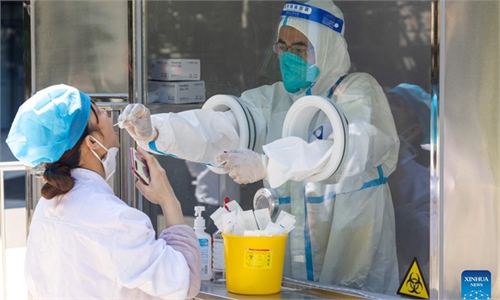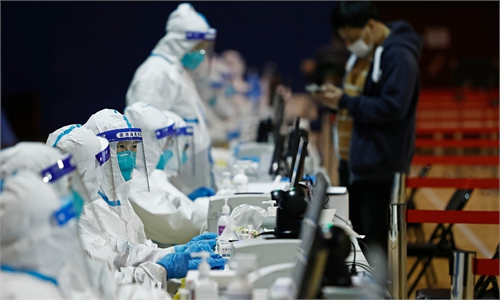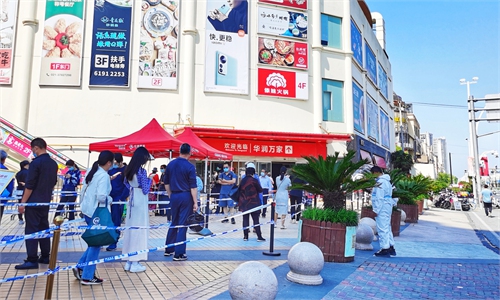‘Fantastic Four’: How four Shanghai residents contribute to anti-epidemic work with unique professional skills
The "Fantastic Four" from Marvel Comics, a fictional four-member superhero team, impresses global audiences with the skills the heroes have, and their determination and courage to fight evil and make the world a better place.
Life is not anime. But in Omicron-hit Shanghai, where millions of people have had to stay at home for weeks, some talented and passionate residents have voluntarily stood up to join in the fight against the "evil enemy" - COVID-19 - in their communities.
Like most popular Marvel characters that use their superpowers to save the world, these ordinary residents from all walks of life apply their various professional skills and work experiences to the daily management of their neighborhoods, trying hard to keep communities safe and orderly during quarantine in effective and creative ways.
The Global Times talked with several Shanghai residents, who are respectively engaged in industries including aviation, technology, communication, and education. They shared their stories on how they are contributing to their communities with their professional skills amid the epidemic.

Airport architect improves nucleic acid test process
Queuing up for a nucleic acid test is a common experience for Shanghai residents amid the city lockdown.
At a residential community in Jing'an district, where some 2,500 people live, the process was likely to last as long as nearly six hours at the beginning. It was inefficient and time-consuming in the eyes of local resident Danny Shen, an airport architect with rich experience in terminal design.
Shen works at the Netherlands Airport Consultants as a China-based resident representative. He recalled the first time the community organized a nucleic acid test for all the residents in March: Volunteers guided residents into long queues lined up in front of five testing stations.
At that time, since the five testing sites were arranged almost parallel to the queue, residents - whose views were somewhat obscured by the volunteers standing next to them - could hardly see the five testing stations. "So we had to spend time walking around each of the sites, before we were able to select a lesser busy site and go there," Shen said.
Shen's professional experiences, designing airport terminals that enable passengers to conveniently board as quick as possible, inspired him to improve the nucleic acid test queuing process.
"By simply turning the queue 90 degrees, to make it perpendicular instead of parallel to the five testing sites," Shen told the Global Times. "The residents can see all the sites and stations at a glance."
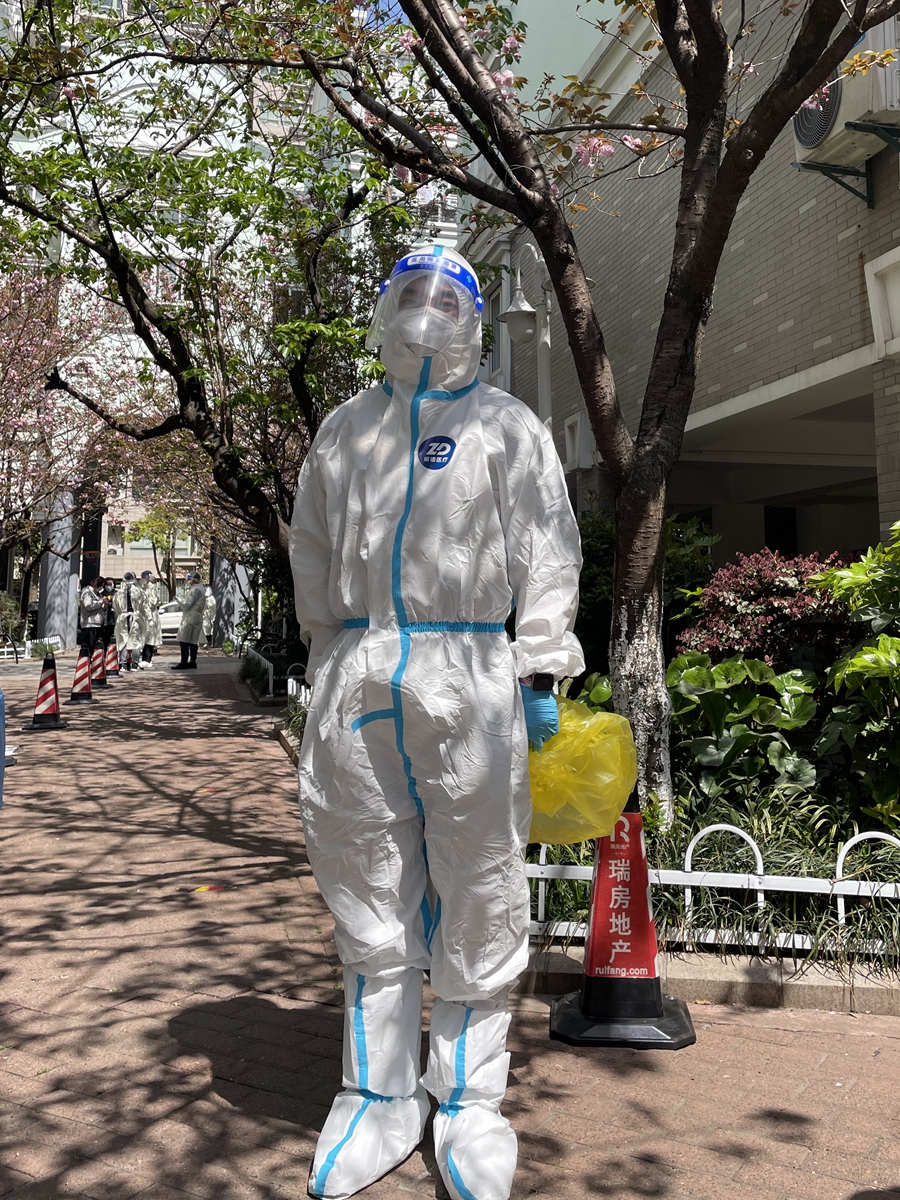
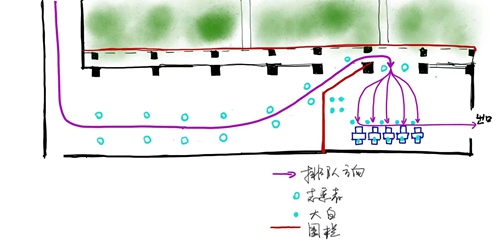
Shen discussed his idea with the community mangers, who agreed to change the direction of the queues in the proceeding tests.
"It shortened the whole process of a nucleic acid test at the community from nearly six hours to no longer than four," Wei Ying, the director of Xinfukangli neighborhood committee that manages Shen's community, told the Global Times.
The new process which saves time and reduces the risks of virus transmission with shorter gathering durations, has received recognition from local residents. "I'm glad to provide convenience for my neighbors with my professional knowledge and experience," Shen said. "That gives me a great sense of accomplishment."
Software engineer develops mini programs to check express deliveries
"As a software engineer, I am very glad that the mini program can be widely used and recognized. As an ordinary young man, I want to make a contribution to the battle against the epidemic in Shanghai," Wang Feng, a 32-year-old senior engineer who has over 10-year of work experience and now works at the Shanghai Yitiao Network Technology Co. told the Global Times.
Living in a residential community with about 6,000 residents, Wang has now been under lockdown for over one month like most other 25 million residents in the megacity. Most residents rely on online shopping or bulk purchases to get daily necessities amid the lockdown.
Sometimes volunteers work till midnight to help deliver goods, but some residents kept asking when their deliveries will arrive, Wang said. He realized that there was too much of a workload for volunteers to handle to ensure each resident can get his or her deliveries on time.
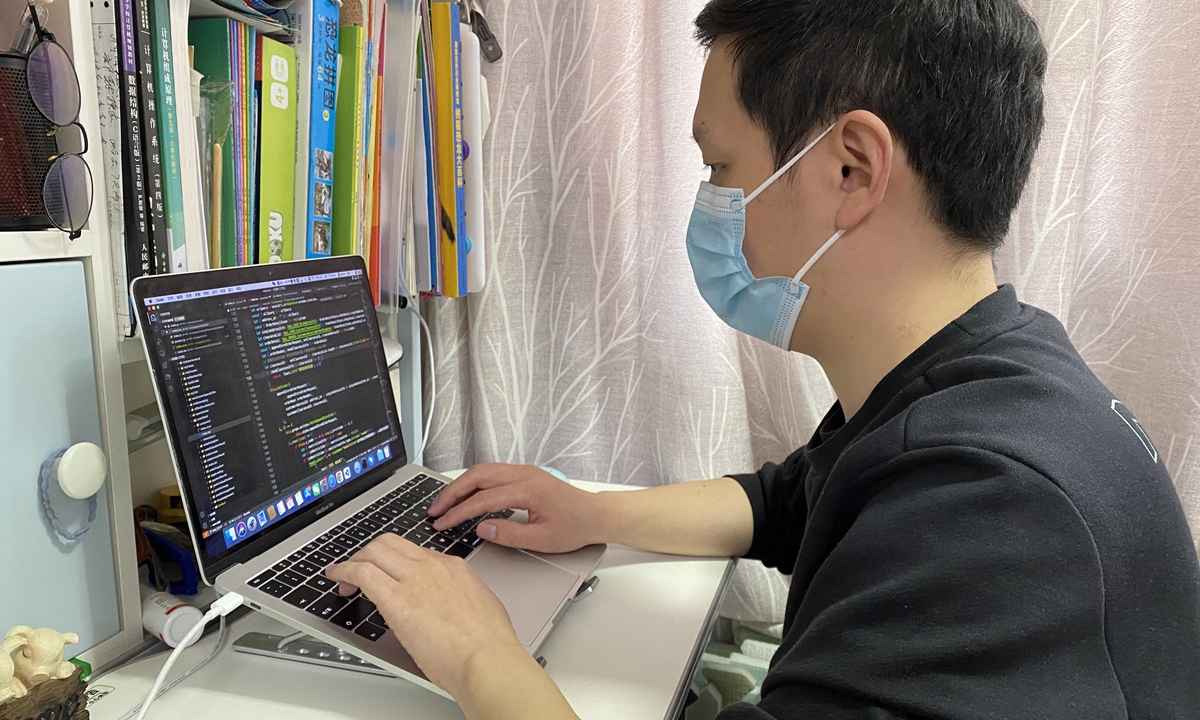
Wang said that normally the similar program would have been developed by three or four people together within a week, but he was eager to provide help and tried his best to update the program to ensure its efficiency.
Residents can check the mini program to get specific information on deliveries and go downstairs to fetch the goods themselves, which can help avoid the need for converging and make the whole process more efficient, Wang said. There have been no new positive cases detected in their community for several days.
Since the program was developed on April 20, over 6,000 bits of information have been posted involving more than 8,500 parcels. The program has been reviewed over 44,000 times.
"Some neighbors wanted to add me as a friend and thanked me for developing the program," Wang noted. "Despite how the epidemic has disarranged our lives, I am willing to help reduce our collective anxiety or concerns."
Communication specialists issue bilingual daily epidemic newsletters
With excellent team work management experience and communication skills at a foreign bank, Ma Chenye and his wife Wang Zhumin have played an important role in organizing and coordinating daily volunteer work in the No.6 Yongfu residential community in Xuhui district in Shanghai.
Ma recalled that the most difficult time for his community with over 300 residents was when the neighborhood committee staffers were infected with COVID-19 and put under quarantine. "But they still kept on working even under quarantine," Ma was moved by them.
As a member of the Communist Party of China, Ma didn't hesitate and wanted to make a contribution to protect his home.
With the communication work experience gained in Hasco Vision Tech (Shanghai) Co., Wang Zhumin realized the importance of releasing timely COVID-19-related information to ease general concerns.
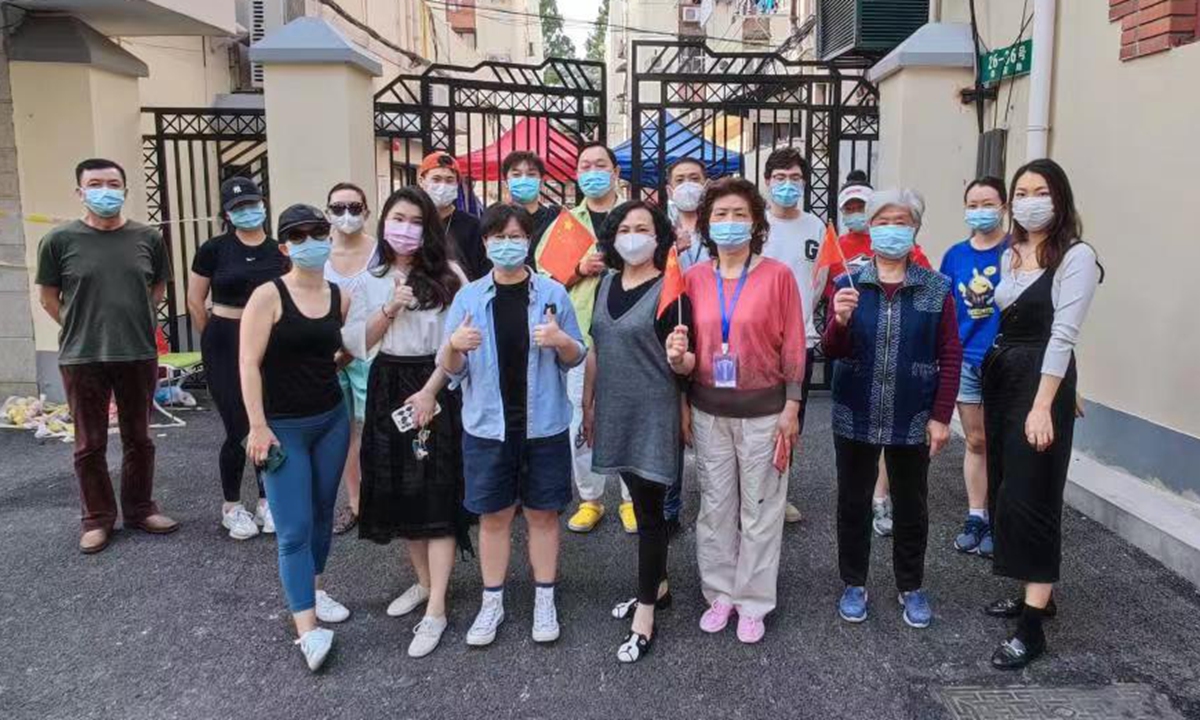
Xu Boyu is a researcher in Shanghai Academy of Environmental Science, and as a volunteer, he has been channeling his energies into pandemic prevention and intercultural communication. He is in charge of the translation of the newsletter and often communicates with foreign residents. "I discussed with another volunteer on how to make the translation more precise and accurate, as we found that some foreigners really need more guidelines amid the lockdown," Xu said.
Thanks to their teamwork, they issued their first edition on April 16. They started to collect information at around 3 pm every day and would finish the newsletter at around 10 pm, and posted it around the neighborhood. "It's a daily working summary, and also it helps to improve our work for the next day," Xu noted.
Milos Babic, also a resident in the same community who is from Montenegro, told the Global Times that, as a foreigner, it was pretty hard to follow all the different bits of news and order the supplies needed. "They created a group just for foreigners to keep us updated with all the news and help us get everything we need," Babic said.
Ukrainian Natalie, another resident living in the community, also had a similar experience. "I think I'm pretty lucky to live in this neighborhood. There are so many nice people in the whole community who turned out to be super friendly and united," Natalie said.
University staffer organizes 50+ bulk purchases
When buying daily necessities became difficult for individuals in Shanghai because of the city lockdown, the "community bulk-buying" - ad hoc collectives ordering directly from wholesale vendors - became a main avenue for residents to get their daily needs.
Being a voluntary community bulk-buying organizer is not easy, which needs lots of passion, patience, a spirit of service, and communication skills to get information from vendors, neighbors come customers, logistics personnel, and community managers, said many Shanghai residents reached by the Global Times.
Liu Jiayu, a local university administrative staffer, found that her work experience in dealing with students qualified her for this unpaid work.
Liu voluntarily became the head of the 10-member bulk-buying organizing team at her residential community in Yangpu district at the beginning of lockdown in early April.
To date she has guided the team to place 55 group-purchase orders for more than 300 neighbors, covering almost all daily necessities from meat, vegetables, and dairy products, to disinfectants.
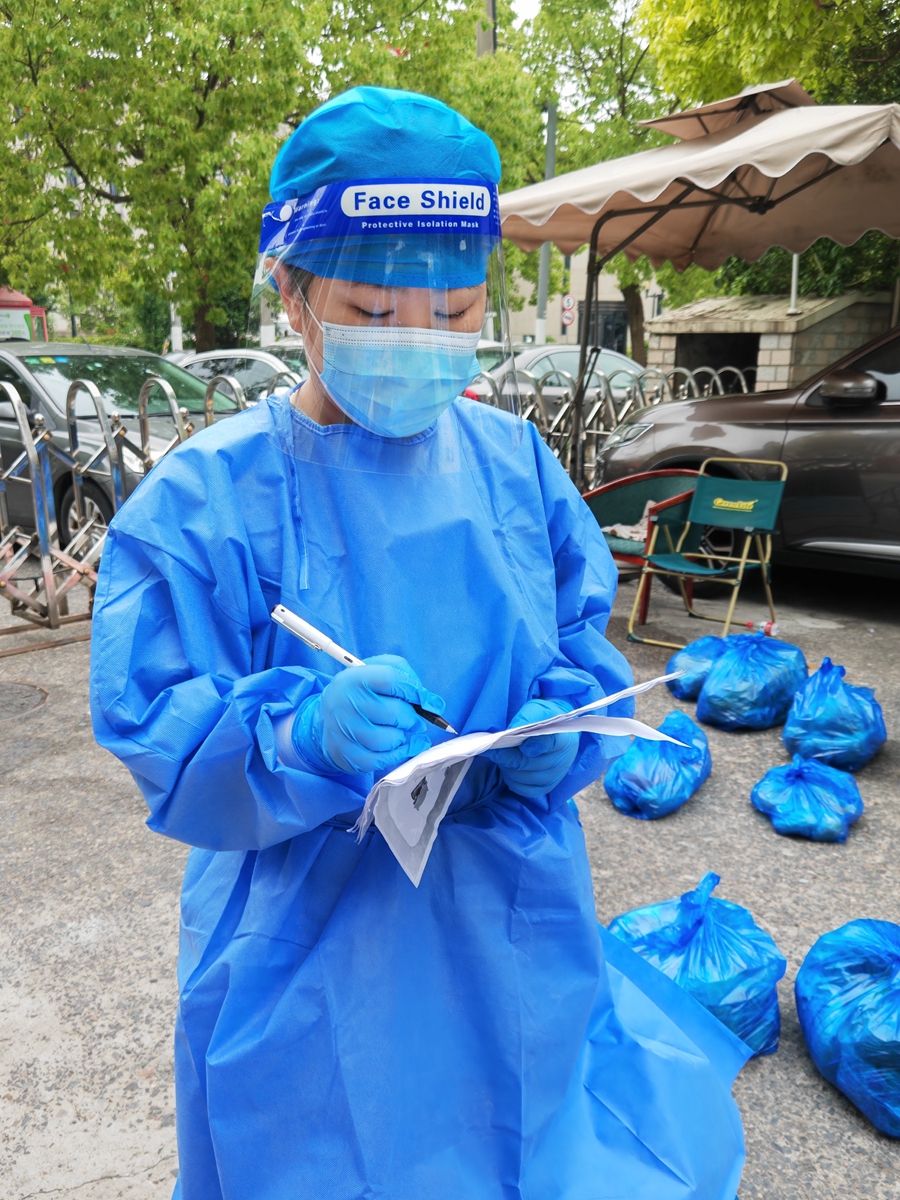
"Small problems occur at times. It's difficult to cater to all tastes," Liu told the Global Times.
She gave the example of how sometimes she has had to cancel some orders for less essential goods to reduce the risk of a potential virus spread. And occasionally, a few neighbors may lodge a complaint about one bulk-buying organizer or another when it comes to pricing. "In those cases, I repeatedly explain to the neighbors the latest policies, or the detailed sources of our orders," Liu said. "Being a university teacher enables me to communicate with my neighbors in a patient and skillful way."
"Just like dealing with my students, I'm good at listening to my neighbors' frustrations and complaints, and help them solve these little problems calmly and mindfully," she added.
Life is not anime. But in Omicron-hit Shanghai, where millions of people have had to stay at home for weeks, some talented and passionate residents have voluntarily stood up to join in the fight against the "evil enemy" - COVID-19 - in their communities.
Like most popular Marvel characters that use their superpowers to save the world, these ordinary residents from all walks of life apply their various professional skills and work experiences to the daily management of their neighborhoods, trying hard to keep communities safe and orderly during quarantine in effective and creative ways.
The Global Times talked with several Shanghai residents, who are respectively engaged in industries including aviation, technology, communication, and education. They shared their stories on how they are contributing to their communities with their professional skills amid the epidemic.

Shanghai Photo: IC
Airport architect improves nucleic acid test process
Queuing up for a nucleic acid test is a common experience for Shanghai residents amid the city lockdown.
At a residential community in Jing'an district, where some 2,500 people live, the process was likely to last as long as nearly six hours at the beginning. It was inefficient and time-consuming in the eyes of local resident Danny Shen, an airport architect with rich experience in terminal design.
Shen works at the Netherlands Airport Consultants as a China-based resident representative. He recalled the first time the community organized a nucleic acid test for all the residents in March: Volunteers guided residents into long queues lined up in front of five testing stations.
At that time, since the five testing sites were arranged almost parallel to the queue, residents - whose views were somewhat obscured by the volunteers standing next to them - could hardly see the five testing stations. "So we had to spend time walking around each of the sites, before we were able to select a lesser busy site and go there," Shen said.
Shen's professional experiences, designing airport terminals that enable passengers to conveniently board as quick as possible, inspired him to improve the nucleic acid test queuing process.
"By simply turning the queue 90 degrees, to make it perpendicular instead of parallel to the five testing sites," Shen told the Global Times. "The residents can see all the sites and stations at a glance."

Danny Shen serves his community as a volunteer.Photo: Courtesy of Danny Shen

The process designed by Shen Photo: Courtesy of Danny Shen
Within only 20 minutes, Shen rapidly drew up the idea that came to his mind "in an instant." "It's not difficult for us (aviation architects)," he said, saying that he applied the "intuitive way finding" design philosophy in his industry to the nucleic acid test queuing process.Shen discussed his idea with the community mangers, who agreed to change the direction of the queues in the proceeding tests.
"It shortened the whole process of a nucleic acid test at the community from nearly six hours to no longer than four," Wei Ying, the director of Xinfukangli neighborhood committee that manages Shen's community, told the Global Times.
The new process which saves time and reduces the risks of virus transmission with shorter gathering durations, has received recognition from local residents. "I'm glad to provide convenience for my neighbors with my professional knowledge and experience," Shen said. "That gives me a great sense of accomplishment."
Software engineer develops mini programs to check express deliveries
"As a software engineer, I am very glad that the mini program can be widely used and recognized. As an ordinary young man, I want to make a contribution to the battle against the epidemic in Shanghai," Wang Feng, a 32-year-old senior engineer who has over 10-year of work experience and now works at the Shanghai Yitiao Network Technology Co. told the Global Times.
Living in a residential community with about 6,000 residents, Wang has now been under lockdown for over one month like most other 25 million residents in the megacity. Most residents rely on online shopping or bulk purchases to get daily necessities amid the lockdown.
Sometimes volunteers work till midnight to help deliver goods, but some residents kept asking when their deliveries will arrive, Wang said. He realized that there was too much of a workload for volunteers to handle to ensure each resident can get his or her deliveries on time.

Wang Feng works at home amid city lockdown in Shanghai. Photo: Courtesy of Wang Feng
After finishing his official job, Wang worked till midnight for five days to develop a WeChat mini program to let residents check and review the status of their express deliveries, and residents could also check whether the goods had been disinfected.Wang said that normally the similar program would have been developed by three or four people together within a week, but he was eager to provide help and tried his best to update the program to ensure its efficiency.
Residents can check the mini program to get specific information on deliveries and go downstairs to fetch the goods themselves, which can help avoid the need for converging and make the whole process more efficient, Wang said. There have been no new positive cases detected in their community for several days.
Since the program was developed on April 20, over 6,000 bits of information have been posted involving more than 8,500 parcels. The program has been reviewed over 44,000 times.
"Some neighbors wanted to add me as a friend and thanked me for developing the program," Wang noted. "Despite how the epidemic has disarranged our lives, I am willing to help reduce our collective anxiety or concerns."
Communication specialists issue bilingual daily epidemic newsletters
With excellent team work management experience and communication skills at a foreign bank, Ma Chenye and his wife Wang Zhumin have played an important role in organizing and coordinating daily volunteer work in the No.6 Yongfu residential community in Xuhui district in Shanghai.
Ma recalled that the most difficult time for his community with over 300 residents was when the neighborhood committee staffers were infected with COVID-19 and put under quarantine. "But they still kept on working even under quarantine," Ma was moved by them.
As a member of the Communist Party of China, Ma didn't hesitate and wanted to make a contribution to protect his home.
With the communication work experience gained in Hasco Vision Tech (Shanghai) Co., Wang Zhumin realized the importance of releasing timely COVID-19-related information to ease general concerns.

Volunteers in No.6 Yongfu community in Xuhui district, Shanghai Photo: Courtesy of Ma Chenye and Xu Boyu
Considering that there are some foreign residents in their community, the couple decided to recruit more volunteers to make a bilingual daily newsletter to let all the neighbors keep up to date with the latest epidemic information such as the number of positive cases detected in the community and their status, and critical information about bulk buying, as well as a communal to-do list.Xu Boyu is a researcher in Shanghai Academy of Environmental Science, and as a volunteer, he has been channeling his energies into pandemic prevention and intercultural communication. He is in charge of the translation of the newsletter and often communicates with foreign residents. "I discussed with another volunteer on how to make the translation more precise and accurate, as we found that some foreigners really need more guidelines amid the lockdown," Xu said.
Thanks to their teamwork, they issued their first edition on April 16. They started to collect information at around 3 pm every day and would finish the newsletter at around 10 pm, and posted it around the neighborhood. "It's a daily working summary, and also it helps to improve our work for the next day," Xu noted.
Milos Babic, also a resident in the same community who is from Montenegro, told the Global Times that, as a foreigner, it was pretty hard to follow all the different bits of news and order the supplies needed. "They created a group just for foreigners to keep us updated with all the news and help us get everything we need," Babic said.
Ukrainian Natalie, another resident living in the community, also had a similar experience. "I think I'm pretty lucky to live in this neighborhood. There are so many nice people in the whole community who turned out to be super friendly and united," Natalie said.
University staffer organizes 50+ bulk purchases
When buying daily necessities became difficult for individuals in Shanghai because of the city lockdown, the "community bulk-buying" - ad hoc collectives ordering directly from wholesale vendors - became a main avenue for residents to get their daily needs.
Being a voluntary community bulk-buying organizer is not easy, which needs lots of passion, patience, a spirit of service, and communication skills to get information from vendors, neighbors come customers, logistics personnel, and community managers, said many Shanghai residents reached by the Global Times.
Liu Jiayu, a local university administrative staffer, found that her work experience in dealing with students qualified her for this unpaid work.
Liu voluntarily became the head of the 10-member bulk-buying organizing team at her residential community in Yangpu district at the beginning of lockdown in early April.
To date she has guided the team to place 55 group-purchase orders for more than 300 neighbors, covering almost all daily necessities from meat, vegetables, and dairy products, to disinfectants.

Liu Jiayu checks a batch of newly arrived goods at her community. Photo: Courtesy of Liu Jiayu
Liu said that each day during the quarantine at home, she spends eight to 10 hours handling bulk-buying related issues. She is always busy with various matters including looking for reliable vendors, informing neighbors about the availability of certain products, collecting neighbors' purchase requests, updating delivery information, and assisting community volunteers to distribute purchases."Small problems occur at times. It's difficult to cater to all tastes," Liu told the Global Times.
She gave the example of how sometimes she has had to cancel some orders for less essential goods to reduce the risk of a potential virus spread. And occasionally, a few neighbors may lodge a complaint about one bulk-buying organizer or another when it comes to pricing. "In those cases, I repeatedly explain to the neighbors the latest policies, or the detailed sources of our orders," Liu said. "Being a university teacher enables me to communicate with my neighbors in a patient and skillful way."
"Just like dealing with my students, I'm good at listening to my neighbors' frustrations and complaints, and help them solve these little problems calmly and mindfully," she added.

